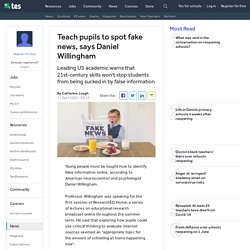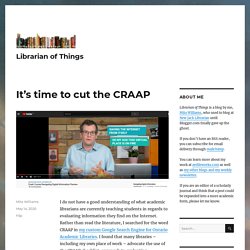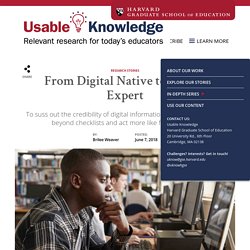

Daniel Willingham on how students can be taught to spot fake news. Young people must be taught how to identify false information online, according to American neuroscientist and psychologist Daniel Willingham.

Professor Willingham was speaking for the first session of ResearchED Home, a series of lectures on educational research broadcast online throughout the summer term. He said that exploring how pupils could use critical thinking to evaluate internet sources seemed an "appropriate topic for the amount of schooling at home happening now". The academic at the University of Virginia argued that pupils are unable to use "21st-century skills" or innate knowledge as "digital natives" to identify fake news, and must be taught how to navigate a range of true and false information online.
Long read: Professor Daniel Willingham on how we learn to read. It’s time to cut the CRAAP – Librarian of Things. I do not have a good understanding of what academic librarians are currently teaching students in regards to evaluating information they find on the Internet.

Rather than read the literature, I searched for the word CRAAP in my custom Google Search Engine for Ontario Academic Libraries. I found that many libraries – including my own place of work – advocate the use of the CRAAP checklist-approach to evaluating information found online. I have never been particularly enthusiastic about the CRAAP checklist approach to evaluating information and I know that I’m not the only librarian who feels this way. From Digital Native to Digital Expert. Read Laterally, Not Vertically Wineberg and McGrew followed three groups of readers as they evaluated digital sources provided in the study: historians, Stanford undergraduates, and professional fact-checkers.

They found that the fact-checkers were fastest and most accurate in vetting information, while the historians and students were easily deceived. The student participants did something they (and all of us) do often: they scrolled and read down the page. But their close reading of the very sources they were tasked to interrogate did little to advance their credibility assessment.
Instead, it misled them. “The close reading of a digital source, when one doesn’t yet know if the source can be trusted,” write Wineburg and McGrew, “proves a colossal waste of time.” As students meandered and fluttered across their screens, they were drawn to websites’ most easily manipulated features — like scientific-sounding language or the presence of an "About Us" page. Don’t Fall for Appearances. Check, Please! Starter Course. Civic Reasoning in a Social Media Environment. Since the November 2016 presidential election, coverage of “fake news” has been everywhere. It’s hard to turn on the TV without hearing the term. Google and Facebook have pitched plans for fighting the menace.1 State legislators have even introduced bills to mandate K–12 instruction on the topic.2 Fake news is certainly a problem. Sadly, however, it’s not our biggest. Fact-checking organizations like Snopes and PolitiFact can help us detect canards invented by enterprising Macedonian teenagers,3 but the Internet is filled with content that defies labels like “fake” or “real.”
For every social issue, there are websites that blast half-true headlines, manipulate data, and advance partisan agendas. The Internet dominates young people’s lives. Unfortunately, our research at the Stanford History Education Group demonstrates they don’t.* Between January 2015 and June 2016, we administered 56 tasks to students across 12 states. Civic Online Reasoning. If young people are not prepared to critically evaluate the information that bombards them online, they are apt to be duped by false claims and misleading arguments.
To help teachers address these critical skills, we’ve developed assessments of civic online reasoning—the ability to judge the credibility of digital information about social and political issues. These assessments ask students to reason about online content. We’ve designed paper-and-pencil tasks as well as tasks that students complete online. These assessments are intended for flexible classroom use. We hope teachers use the tasks to design classroom activities, as the basis for discussions about digital content, and as formative assessments to learn more about students’ progress as they learn to evaluate online information.
As part of MediaWise, the Stanford History Education Group is developing and evaluating new civic online reasoning lesson plans for middle and high school students. Lateral reading study for information accuracy. SIFT - news literacy site. Around the world Austria: A nine-year court case over controversial statements made by an Austrian woman about the Prophet Muhammad ended last week.
The European Court of Human Rights upheld a lower court decision that the woman, who was identified only as “Mrs. S.,” had defamed the marriage of the founder of Islam in her two seminars titled “Basic Information About Islam.” The court ruled that what she had said “goes beyond the permissible limits of an objective debate” and free expression. She was fined 480 euros (about $547). Online Verification Skills with Mike Caulfield.